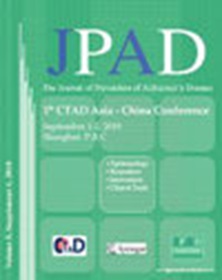数字技术能促进阿尔茨海默病治疗的发展吗?
IF 7.8
3区 医学
Q1 CLINICAL NEUROLOGY
引用次数: 11
摘要
该报告探讨了数字技术在阿尔茨海默病药物开发研究中产生新终点和数字生物标志物的潜力。从文献和小说试点中,我们探索了创新数字技术在将睡眠障碍和步态变化等生理行为数字化方面的价值。现在有技术可以监测和量化我们在家里使用和互动电子产品,使用社交平台和智能手机,地理定位,睡眠和活动模式。这些多模式数字数据是捕获需要更高认知过程的更复杂的日常生活活动的可行替代方案,并且是疾病的敏感预测因子。生物传感器和物联网(IoT)的结合,提供了以连续、被动和低负担的方式收集高度相关的客观数据的潜力。数字端点和生物标志物可能在阿尔茨海默病患者的诊断、监测和治疗开发中具有价值。本文章由计算机程序翻译,如有差异,请以英文原文为准。
Can Digital Technology Advance the Development of Treatments for Alzheimer’s Disease?
The report explores the potential digital technology has to generate novel endpoints and digital biomarkers for Alzheimer’s disease drug development studies. Drawing from literature and novel pilots, we explore the value of innovative digital technology to digitize physiological behaviours such as sleep disturbance and gait changes. Technology now exists to monitor and quantify our use and interaction with electronics in the home, the use of social platforms and smart-phones, geolocation, sleep and activity patterns. These multimodal digital data are a feasible alternative to capturing the more complex activities of daily living that require higher cognitive processes and are a sensitive predictor of disease. The combination of biosensors and the internet of things (IoT), offers the potential to collect highly relevant, objective data in a continuous, passive and low burden manner. Digital endpoints and biomarkers could have value in the diagnosis, monitoring and development of therapies for patients living with Alzheimer’s disease.
求助全文
通过发布文献求助,成功后即可免费获取论文全文。
去求助
来源期刊

Jpad-Journal of Prevention of Alzheimers Disease
CLINICAL NEUROLOGY-
自引率
7.80%
发文量
85
期刊介绍:
The JPAD « Journal of Prevention of Alzheimer’Disease » will publish reviews, original research articles and short reports to improve our knowledge in the field of Alzheimer prevention including : neurosciences, biomarkers, imaging, epidemiology, public health, physical cognitive exercise, nutrition, risk and protective factors, drug development, trials design, and heath economic outcomes.
JPAD will publish also the meeting abstracts from Clinical Trial on Alzheimer Disease (CTAD) and will be distributed both in paper and online version worldwide.
 求助内容:
求助内容: 应助结果提醒方式:
应助结果提醒方式:


